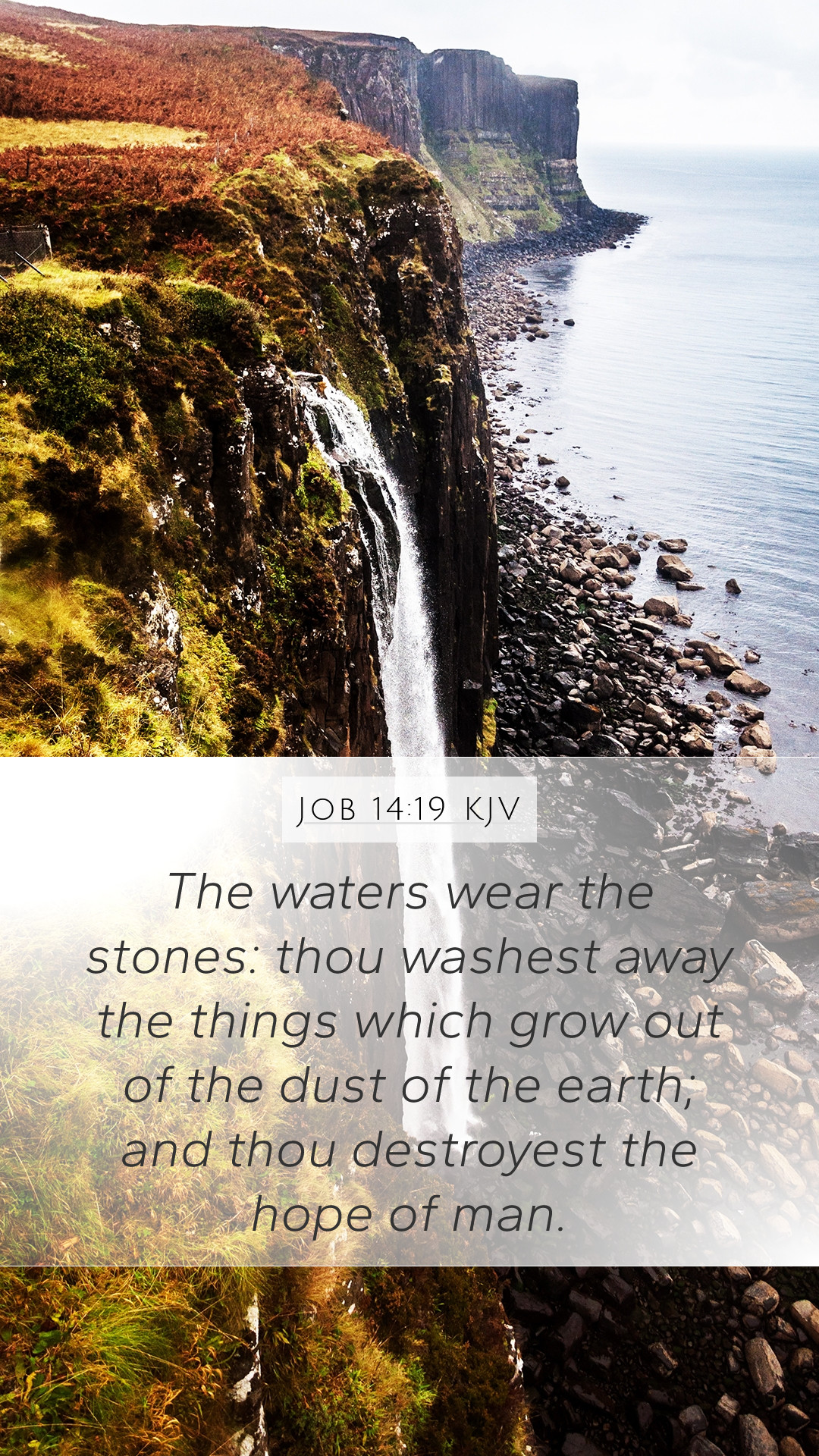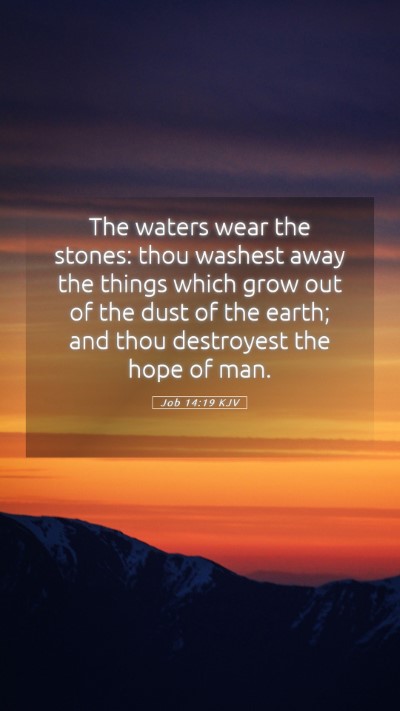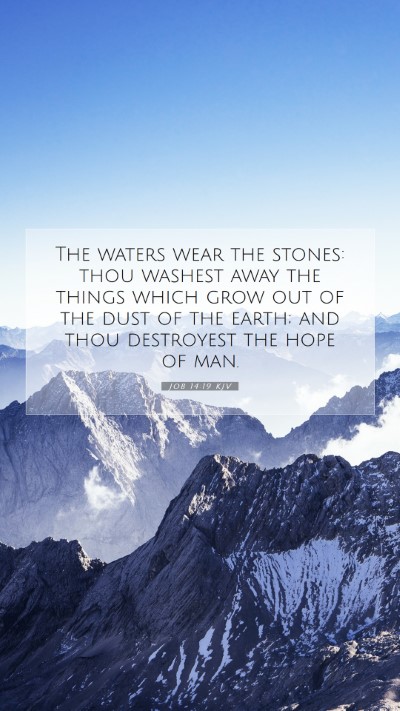Old Testament
Genesis Exodus Leviticus Numbers Deuteronomy Joshua Judges Ruth 1 Samuel 2 Samuel 1 Kings 2 Kings 1 Chronicles 2 Chronicles Ezra Nehemiah Esther Job Psalms Proverbs Ecclesiastes Song of Solomon Isaiah Jeremiah Lamentations Ezekiel Daniel Hosea Joel Amos Obadiah Jonah Micah Nahum Habakkuk Zephaniah Haggai Zechariah MalachiJob 14:19 Meaning
What is the meaning of Job 14:19?
The waters wear the stones: thou washest away the things which grow out of the dust of the earth; and thou destroyest the hope of man.
Job 14:19 Bible Verse Meaning
Understanding Job 14:19
Job 14:19 states: "The waters wear the stones: thou washest away the things which grow out of the dust of the earth; and thou destroyest the hope of man." This verse captures the essence of suffering, the transient nature of life, and the seemingly relentless forces of nature that erode both strength and hope. Below is a comprehensive analysis of this verse combining insights from public domain commentaries by Matthew Henry, Albert Barnes, and Adam Clarke.
Bible Verse Meaning
Through various commentaries, we gain a better understanding of this verse and its implications for human existence.
Overview
Job's lament in this verse underscores a profound truth about the inevitable decay that comes with time and the challenges faced by humanity. Through nature’s influences, such as water wearing down stones, Job reflects on how life wears upon human hope and vitality.
Insights from Commentaries
-
Matthew Henry's Commentary:
Henry notes that the image of water washing away stones serves as a metaphor for the trials and afflictions that gradually erode human strength and hope. He emphasizes that just as water can continuously wear down the hardest objects, life's adversities can gradually diminish our fortitude.
-
Albert Barnes' Commentary:
Barnes elaborates that the verse illustrates the power of nature in contrast to the fragility of human existence. He points out that despite the seeming permanence of stones, they too are subject to change and erosion, symbolizing humanity's futile struggle against the forces that destroy hope.
-
Adam Clarke's Commentary:
Clarke indicates that the verse captures the inevitability of death and despair. His interpretation implies that, like the stones that are worn down, human hopes and aspirations are inevitably distressed and ultimately destroyed by life’s relentless challenges.
The Nature of Hope
The verse speaks poignantly to the "hope of man" which Job defines as being fragile. In the framework of biblical wisdom literature, hope is often presented as a crucial element of the human experience, yet in this context, it is depicted as something that can easily be crushed.
Connection to the Trials of Job
This verse fits within the larger narrative of Job's suffering. Throughout the book, Job grapples with profound loss and seeks to understand God’s purpose in his tribulations. The connection between natural phenomena and human suffering is a recurrent theme that invites readers to reflect on their own experiences and the nature of their faith.
Bible Verse Interpretations
The interpretations offered by these commentaries help to enhance our understanding of how the imagery used by Job reflects deeper spiritual and existential themes.
Spiritual Insights
Across the commentary spectrum, many scholars emphasize the spiritual implications of the erosion of hope. It serves as a reminder of the transience of life and the ultimate reliance on divine sustenance. This provides context for believers dealing with their own struggles and uncertainties.
Relevance in Daily Life
This verse remains relevant today, as many face hardships that threaten to erode their hopes and dreams. Understanding that these challenges are a part of the human condition can provide comfort and reassurance to those wrestling with despair.
Cross References
This verse resonates with several other biblical passages that elaborate on themes of hope, suffering, and the transient nature of life:
- Psalms 39:5-6: "Behold, thou hast made my days as an handbreadth; and mine age is as nothing before thee: verily every man at his best state is altogether vanity." - This reflects the fleeting nature of human life.
- Ecclesiastes 1:2: "Vanity of vanities, saith the Preacher, vanity of vanities; all is vanity." - It emphasizes the emptiness of worldly pursuits.
- Isaiah 40:6-8: "The voice said, Cry. And he said, What shall I cry? All flesh is grass, and all the goodliness thereof is as the flower of the field." - This verse compares human life to grass, underscoring its temporary nature.
Application of the Verse
When applying Job 14:19 to our lives, it can serve as a warning against placing too much stock in worldly hopes and aspirations. Instead, believers are encouraged to seek hope and strength from God, who remains unchanging amidst life’s vicissitudes.
Conclusion
Job 14:19 is a poignant reminder of the challenges of earthly life and the necessity of anchoring our hope in God. Through the combined insights of historical commentaries, we gain a richer understanding of this verse, which speaks to the universal human experience of suffering and the search for meaning. In interpreting this verse, we are not only analyzing Scripture but engaging with the depths of human emotion and divine purpose, making it a significant topic for any Bible study group or online Bible study.


